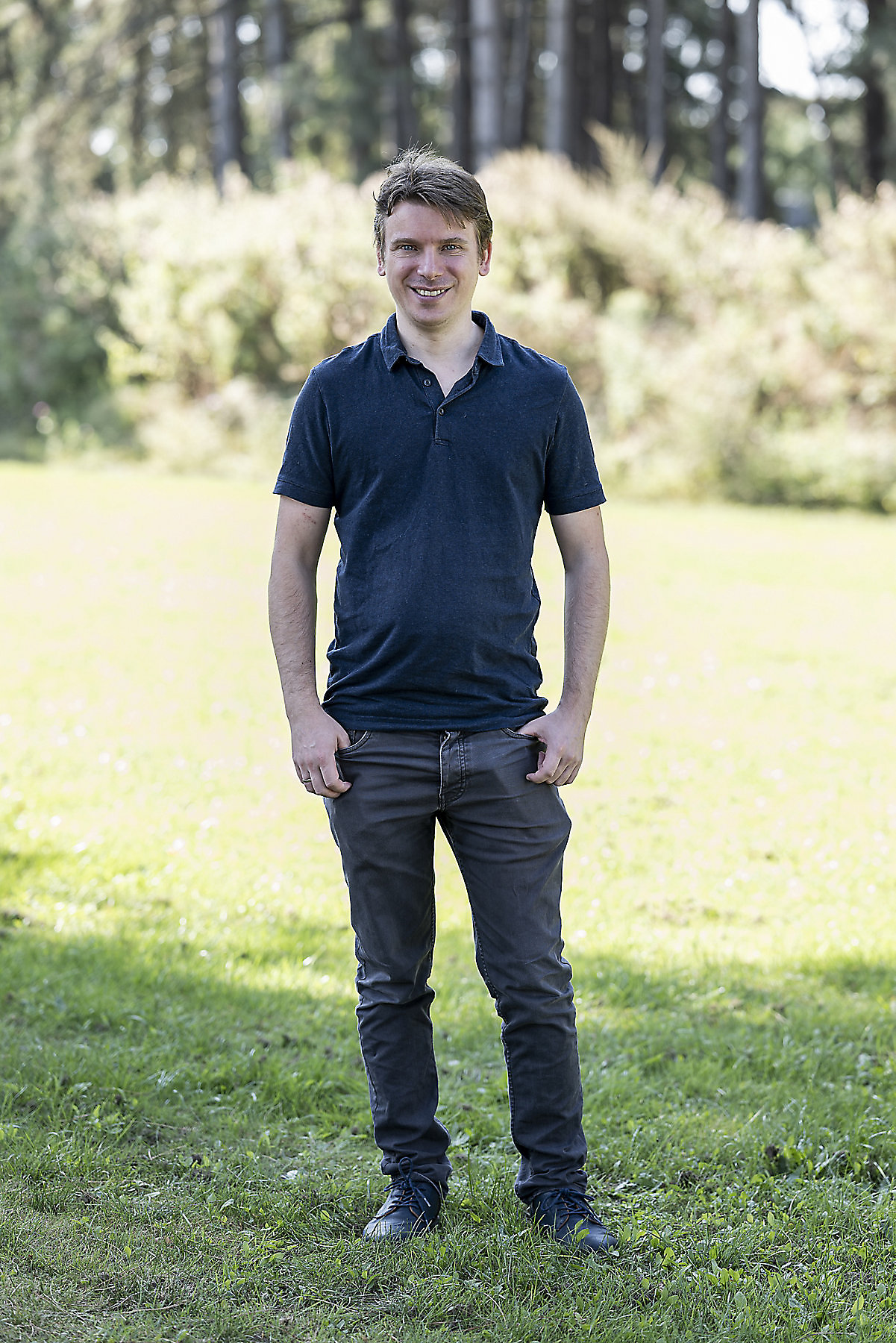Waut Dooghe joined Kemin Food Technologies EMEA (KFT EMEA) when it was established in 2006. In those years, he made his mark on our product portfolio and contributed to research, steadily growing along with the company. We sat down together to look back on his career at KFT EMEA thus far.

Name: Waut Dooghe
Nationality: Belgian
Job title: Senior Research Associate
Years of service @Kemin: 17
Focus market segment: fats & oils, meat and bakery
After your studies in chemistry, you started working at Kemin. Did you already know the company? How did it all start?
I studied chemistry and after graduation I was looking for a job matching these credentials. At the same time, Kemin was starting up a new department to focus on food applications and they were looking for someone with a background in chemistry to work full time in their laboratory. After all, cooking is chemistry. That’s how I got in touch with them and was hired soon after.
Did you already have a certain affinity with natural antioxidants and plant extracts, or has it grown over time?
With organic chemistry I was already familiar with things like lipid oxidation. However, during my studies we would primarily learn about synthetic antioxidants. Kemin’s focus is on natural plant extracts and antioxidants so this was new for me. However, over the years I’ve learned a great deal about these products. It’s a positive story, knowing you have a natural substitute for their synthetic counterpart that is equally or even more effective. And sustainability, organic, all natural, are terms that are interwoven with our company’s DNA, which I can only support.
Where does your interest in fats & oils come from? Is that something that has always fascinated you?
It’s something that came with the job because almost every food product contains a fat fraction. But my interest has certainly grown over the years because of the specific markets we work in. The oxidation of oils is one of the main parameters in terms of shelf life or food safety. It’s a rather broad theme within the food industry; we need specific solutions for specific applications in order to stabilise them. And even though I’ve been working on this subject matter for a long time, I keep discovering and learning new developments. That’s what keeps it interesting.
You have contributed to the further expansion of the FORTIUM® portfolio. What can you tell us about that?
I was involved since the very start. In the beginning we only had the FORTIUM product line based on either mixed tocopherols or rosemary. We quickly discovered that these two components could be more effective when blended, and then we were looking for tailor made blends in order to strengthen their effectiveness. Some molecules, for example, don’t dissolve or mix well in other substances, so specific emulsifiers were required to develop stable blends. That’s what resulted in the development of new and more complex blends. One of the first I worked on was FORTIUM RG20 Liquid, a synergistic combination of natural rosemary extract and gallic acid, which remains a popular product even after 15 years.
You are also known as the developer of FORTI-FRYTM. How did this product come about?
Frying oil is an important market segment within the food industry. Because it’s used at very high temperatures, the chemical reactions that occur during deep frying are different than food that is stored at room temperature or in a fridge. That means that the typical antioxidants that are effective at shelf life conditions are less effective at frying applications. So, there was a need for a specialised solution wherein the frying oil deterioration is delayed, and the fried product will evenly brown and cook faster. After two years of developing and extensively testing – we’ve fried many kilos of hand-cut fries - with the addition of FORTI-FRY in our portfolio, we covered another customer need.
Do you notice an increasing demand for natural solutions within the oil and frying industry?
As long as I know there always has been a demand for natural solutions, although it’s very region specific. Some manufacturers look for cost-effective solutions over natural ones, but natural ingredients are preferred more and more.
In March 2020, you were given the opportunity to present a poster at the 10th International Symposium on Deep-Frying in Hagen, Germany. Were the reactions positive?
First of all, it’s a great recognition from Kemin that they entrust me to present at this symposium. The poster was about frying oil that was enriched with refined salmon oil, which is relatively oxidative stable oil and neutral in taste and odour. Our customer wanted to offer a healthier frying oil, but in terms of stability, it required an effective solution. With FORTI-FRY, we’ve proven that we could improve both the frying life and the oxidative stability of the frying oil blend.
Within the " fats & oils" market segment, Kemin also offers FrySMARTTM, a tailor-made platform of solutions for bulk oil, frying oil and fried product. How do you proceed when a customer in the food industry requires a specific solution for their product?
Different stages of the process require different solutions. We look at the finished product, what kind of frying oil is used, or the storage conditions of the end product. While FORTI-FRY would always be recommended for the frying oil itself, the finished product might be more effectively stabilised with a solution containing rosemary. It really depends on the customer application and need.
In that regard you’re also involved in Customer Laboratory Services (CLS). What’s your role in the team?
I closely work with our Technical Sales Managers. When they require a specific solution for a customer, we will start a project. After we’ve discovered the ‘problem’, we can recommend a protocol. The customer can then prepare food samples which we can use to perform shelf life studies on in order to look for the best possible solution for that specific product. When the study is finalised, we share the results to the customer by providing a final report of the results.
You've been working at Kemin Food Technologies EMEA the longest. You were literally there from the beginning. What's the biggest difference between now and when you started?
First of all, the team size. At the start, I was the only full-time employee in our department. We were also more depending on our colleagues in the United States. Now we have our own legal department, specialised scientists, marketing, salespeople, … Furthermore, the amount and types of products we can offer have increased over the years. We now have antimicrobials, antioxidants and so on, all based on a wide variety of natural ingredients. Of course, having a bigger team and better equipment, we can also perform more detailed testing, resulting in better product recommendations.
During these 15 years at KFTEMEA, you have gained a lot of experience and know-how. Is there something specific that you want to accomplish at Kemin in the short term?
I hope I can specialise more, for example focusing on the bakery market. We are looking to expand in this segment with new innovative solutions. This means there’s going to be challenges, which I hope to tackle, while learning more on the subject. My goal for the future is to develop effective products, in terms of bread improvers, pre-mixes and tailor-made solutions for bread and tortilla.
We can definitely speak of a rich career. What accomplishment makes you most proud?
The first time I was granted an award at the Kemin Worldwide Scientific Meeting. During these international meetings at the company’s headquarters, scientists can show their findings. At that time, I presented a poster and was honoured. It’s perhaps more than 10 years ago, but I still remember it fondly. More recently, the development of FORTI-FRY and working with the first customer who started using it. Following that our team held a seminar for a potential customer. It was a more hands-on approach, like a workshop, where they were able to test our product in their oil, and where we could explain the science behind it all. We were able to convince the customer with this close approach of working together. It was a successful team effort between CLS, sales and marketing.

At your service during Covid-19 - a vlog from our team
Browse Latest Articles by Topic
- At your service during Covid-19 - a vlog from our team
- Food Myths
- Food Safety and Shelf Life Solutions for Breakfast Trends
- From clean to clear labels with Kemin
- Glenn De Ceulaer talks NaturCEASE
- Naturally increase the frying life of oils with FORTI-FRY
- Interview Sustainability Griffith Foods
- Interview with customer DP Supply
- Interview with prof. Frank Devlieghere – Food expert (part 1)
- Interview with Prof. Frank Devlieghere – Food expert (part 2)
